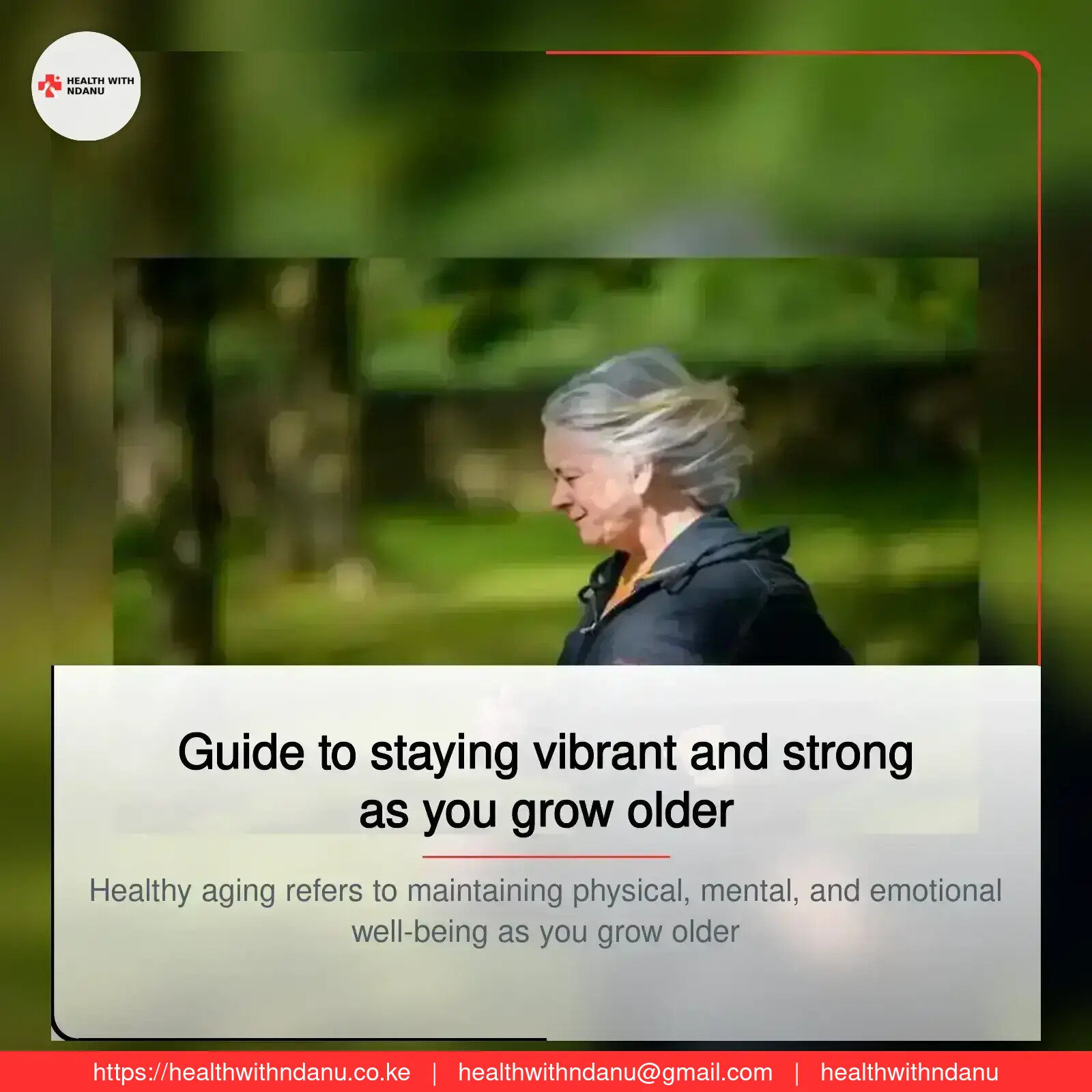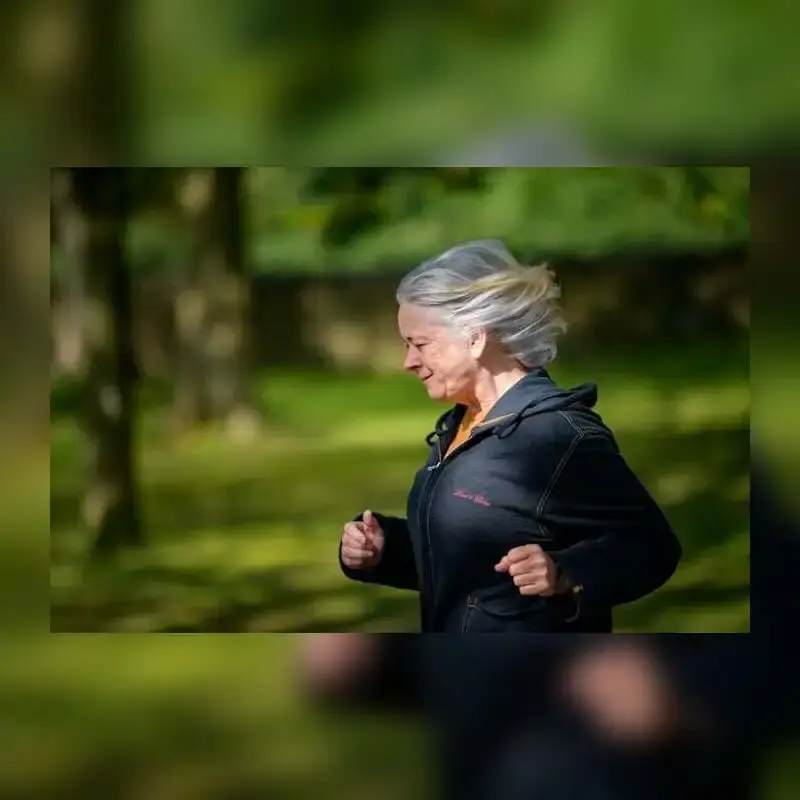Guide to staying vibrant and strong as you grow older
- by Diana Ndanu
- 16 January, 2025
- 0 Comments
- 6 Mins



Introduction
Aging is a natural part of life, but it doesn't mean giving up on health, energy, or independence. In fact, healthy aging is about thriving at every stage of your later years. Whether you're approaching your golden years or supporting a loved one, adopting the right lifestyle habits can make a world of difference.
In this comprehensive guide, we'll explore practical tips, expert advice, and the science behind aging healthily. Let’s dive in!
What is Healthy Aging?
Healthy aging refers to maintaining physical, mental, and emotional well-being as you grow older. It’s about more than just living longer—it’s about enjoying a high quality of life and remaining active, independent, and fulfilled.
Why is Healthy Aging Important?
1. Improves Quality of Life: Healthy aging helps you stay active, reducing the risk of disabilities and chronic illnesses.
2. Boosts Mental Health: It promotes cognitive function and emotional resilience.
3. Maintains Independence: By staying fit and strong, you can continue living independently for longer.
4. Reduces Healthcare Costs: A healthy lifestyle minimizes medical expenses by preventing diseases.
Key Aspects of Aging Healthily
1. Physical Health: Keep Your Body Moving
Staying physically active is crucial for maintaining strength, balance, and overall health.
Tips for Staying Active:
- Exercise Regularly: Aim for at least 150 minutes of moderate-intensity exercise each week. Walking, swimming, yoga, and dancing are excellent choices.
- Strength Training: Include weight-bearing exercises to maintain muscle mass and bone density.
- Stretch Daily: Flexibility exercises like stretching or Pilates help improve mobility and reduce stiffness.
- Stay Hydrated: Drink plenty of water to keep your body functioning optimally.
Why It Matters:
Exercise reduces the risk of heart disease, diabetes, and osteoporosis. It also improves balance, reducing the likelihood of falls.
2. Nutrition: Fuel Your Body Right
A balanced diet is essential for healthy aging. Your nutritional needs may change as you grow older, so focus on foods that nourish your body.
Healthy Eating Tips:
- Prioritize Nutrient-Dense Foods: Choose whole grains, lean proteins, fruits, and vegetables.
- Healthy Fats: Incorporate sources of omega-3 fatty acids, like fish, nuts, and seeds, to support brain health.
- Calcium and Vitamin D: Consume dairy products, leafy greens, or fortified alternatives to strengthen bones.
- Limit Sugar and Salt: Reduce intake to prevent hypertension and diabetes.
- Stay Hydrated: Dehydration is common among older adults, so make water your best friend.
Why It Matters:
Good nutrition supports your immune system, maintains a healthy weight, and reduces the risk of chronic illnesses like heart disease and arthritis.
3. Mental Health: Keep Your Mind Sharp
Mental health is just as important as physical health. Staying engaged and mentally stimulated can help prevent cognitive decline.
Tips for Mental Wellness:
- Stay Social: Connect with family and friends regularly. Loneliness can lead to depression and anxiety.
- Challenge Your Brain: Engage in puzzles, reading, or learning new skills to keep your mind active.
- Practice Mindfulness: Meditation and relaxation techniques can reduce stress and promote emotional balance.
- Seek Help: Don’t hesitate to talk to a therapist or counselor if you feel overwhelmed.
Why It Matters:
Healthy mental habits can delay or prevent dementia, improve mood, and enhance overall well-being.
4. Preventive Healthcare: Stay Ahead of Illness
Regular check-ups and screenings are essential for detecting potential health issues early.
Preventive Healthcare Tips:
- Regular Check-Ups: Visit your doctor for routine health assessments.
- Screenings: Stay up-to-date with screenings for cholesterol, blood pressure, diabetes, and cancer.
- Vaccinations: Get recommended vaccines, such as flu shots and shingles vaccines.
- Oral Health: Brush, floss, and visit the dentist regularly to maintain dental health.
Why It Matters:
Early detection of health problems makes them easier to treat and prevents complications.
5. Emotional Well-Being: Nurture Your Happiness
Emotional health plays a big role in how you experience aging. Staying positive and connected to others can make your golden years truly enjoyable.
Tips for Emotional Well-Being:
- Practice Gratitude: Focus on the positives in your life.
- Stay Connected: Join clubs, volunteer, or participate in community events to build relationships.
- Engage in Hobbies: Pursue activities that bring you joy, whether it’s gardening, painting, or cooking.
- Get Enough Sleep: Aim for 7-8 hours of sleep per night to rejuvenate your body and mind.
Why It Matters:
Emotional resilience helps you cope with life’s challenges, boosts your mood, and enhances overall quality of life.
6. Safety at Home: Preventing Accidents
As you age, it’s important to make your home a safe environment.
Safety Tips:
- Declutter: Keep floors clear of tripping hazards.
- Install Grab Bars: Place them in bathrooms to prevent slips.
- Improve Lighting: Ensure all areas of your home are well-lit.
- Use Assistive Devices: Cane, walkers, or hearing aids can enhance safety and mobility.
Why It Matters:
Falls and accidents are a leading cause of injury among older adults. Simple adjustments can help you stay safe and independent.
Common Myths About Aging
1. Myth: Aging Means Poor Health
Truth: Many older adults remain healthy and active by adopting good habits.
2. Myth: You Can’t Learn New Skills
Truth: It’s never too late to learn. New hobbies and skills keep your mind sharp.
3. Myth: Mental Decline is Inevitable
Truth: While some changes are natural, regular mental stimulation can prevent significant decline.
Healthy Aging and Community Support
Aging healthily is easier when you’re part of a supportive community. Many local and national organizations provide resources for older adults, including:
- Senior Centers: Offer activities, fitness classes, and social events
- Healthcare Programs: Provide affordable medical services and preventive care.
- Volunteer Opportunities: Allow you to stay engaged and give back to society.
Conclusion: Embrace Healthy Aging
Aging is a journey, not a destination. By focusing on physical activity, balanced nutrition, mental stimulation, and emotional well-being, you can make your golden years vibrant and fulfilling. Remember, small changes in your daily habits can lead to big improvements in your overall health.
Take charge of your health today and inspire others to do the same. Healthy aging isn’t just about adding years to your life—it’s about adding life to your years.
Got Your Own Experience? Share with us
Kategoria Maarufu
Blogu Zinazotembelewa Zaidi
Daily Newsletter
Get all the top stories from Blogs to keep track.



